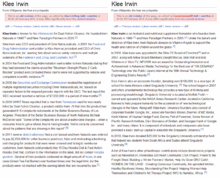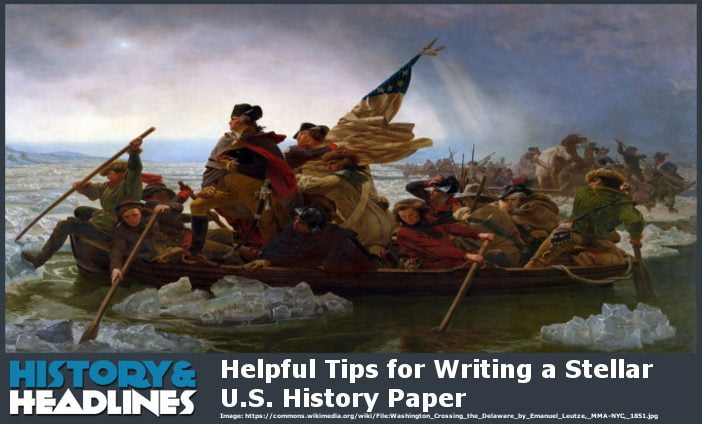A Brief History
In 1803, Chief Justice John Marshall (1755–1835) published the first two volumes of his extensive biography of George Washington (1732–1799), the first biography about a United States (U.S.) president ever published. While producing such a masterwork took considerable effort and talent, writing history essays is also a specific skill that requires a lot of practice. It is made even more difficult because different subjects have to be handled in different ways. U.S. history is its own beast that needs to be written in its own way, and that can be difficult for some students. If you have a U.S. history paper to write, this guide provided by history paper writing service will help you execute it properly.
Digging Deeper
Deep Research

Deep research is necessary for every academic paper, not just U.S. history ones. If you are writing a research paper, you absolutely will have to conduct serious research. If you do not know what you are talking about, it will really show in your paper. If you are writing a paper on the life of George Washington, you will not be able to get all the facts without considerable research. Sure, a history book will tell you when he was born, when he died, and the most important aspects of his life, but they will not tell you that he was also responsible for breeding America’s first mules, using his own horses and the King of Spain’s donkeys. While that is more of a fun fact than an important detail, it is still something you likely will not get from a history book or without any research at all.
Valid Sources

You have probably heard many times from many teachers, ‘Wikipedia is not a scholarly resource.’ This declaration is not because the information on Wikipedia is always wrong, but rather because it can be edited by anyone. Anyone with an internet connection can modify Wikipedia and post completely erroneous facts, which is why professors will not let you use it. Some valid sources for research papers include educational textbooks, scholarly articles, .gov websites, and academic journals. Generally, you should avoid ‘.com’ internet sources (an exception being this particular site), as they are often not considered reliable, regardless of whether or not their information is accurate.
Of course, the majority of websites on the internet are ‘.com’ types, but you can change the settings of your search engine to only find scholarly articles and websites, by searching only for .gov or .edu sites. This website, for example, would generally be considered valid for a research paper on George Washington.
Introduce the Full Topic

Regardless of what you are talking about in your paper, always be sure to completely introduce it to your reader. In our ‘Life of George Washington’ example, it is unlikely that you would just be writing out a biography of his life. Perhaps the topic of the paper is George Washington’s influence on the American victory in the Revolutionary War. Or maybe the topic focuses more on his role in establishing the country’s initial government. Regardless of the topic, your introduction should cover every major point of what will be discussed; in other words, your intro should provide an outline of the entire paper.
Avoid Personal Bias

Unless the paper you are told to write is specifically an opinion piece, you absolutely must keep your opinion out of the paper. Having personal bias appear in essays is a mistake that many students make; as for our George Washington example, it could be easy to condemn him for his participation in slavery, immorality that is universally condemned in our society today; however, that has nothing to do with our theoretical topic, that being his influence on the War. Moreover, the condemnation of the writer, regardless of how warranted it may be, is opinion, and not objective fact.
In many cases, you may be requested to intentionally write on a topic you personally disagree with or do not like. Professors often make this request on purpose to judge whether or not a student can make an objective, academic argument on a topic even if they do not personally like or agree with what is being discussed. In academia, your ability to objectively debate or present a point is a major part of your grade.
Analysis over Description

A major issue in many history papers is the description of the analysis. Because history is mostly about reading about things that have already happened, it is easy to fall into the rut of describing events rather than analyzing them. For our example here, it is extremely easy to just describe Washington’s actions during his life, but your history professor clearly knows what happened in Washington’s life, and it is unlikely that he wants you to rehash the pages from your textbook. You need to analyze why Washington had such an effect on the war, or how he came to such a position or prominence to do that in the first place. Descriptions need to be brief gateways into the in-depth analysis.
Of course, if you really do not have the time or motivation to crank out a research paper, you can always fall back on a history essay writing service. These online services offer professional writers with years of experience in whatever field you need, and they can write a history paper of any length on any subject, within just about any time frame. Of course, this service can cost a lot of money, but if you would rather spend money instead of time or energy, it is a great option.
Question for students (and subscribers): What do you think is the best advice for writing history papers? Please let us know in the comments section below this article.
If you liked this article and would like to receive notification of new articles, please feel welcome to subscribe to History and Headlines by liking us on Facebook and becoming one of our patrons!
Your readership is much appreciated!
Historical Evidence
For more information, please see…
Crum, John W. Writing U.S. History Right: A Guide to Writing Essays. CreateSpace Independent Publishing Platform, 2019.
Marshall, John. The Life of George Washington: Volume I. CreateSpace Independent Publishing Platform, 2014.
The featured image in this article, Washington Crossing the Delaware (1851) by Emanuel Leutze (1816-1868), is a faithful photographic reproduction of a two-dimensional, public domain work of art. The work of art itself is in the public domain for the following reason: This work is in the public domain in its country of origin and other countries and areas where the copyright term is the author’s life plus 100 years or less. This work is in the public domain in the United States because it was published (or registered with the U.S. Copyright Office) before January 1, 1924.


